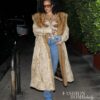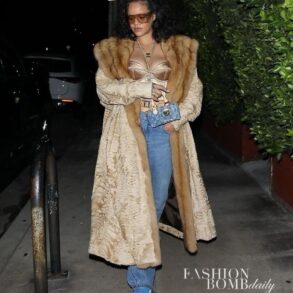In November of 2021, Young Thug appeared on Saturday Night Live to promote his second studio album, Punk. Introduced by the actor Rami Malek, the Atlanta rapper appeared sporting a puffy fuchsia fur coat and baby pink pants. He was joined on stage by the rapper Gunna, the pop singer Nate Ruess and the drummer Travis Barker. His two performances that night played up the genre-bending, psychedelic sensibilities that the rapper had long infused into his art.
That night, in his performance of Tick Tock, a song that didn’t make the final tracklist for Punk, he rapped: “I was a capo in my hood way before a plaque or a mention.”
Two years later, as the rapper faces a racketeering trial in Georgia that begins on Monday, the pre-trial hearings have featured fierce debates over lyrics including this one. Young Thug, whose real name is Jeffery Williams, is arguing that his lyrics are fictional works of art that do not serve as admissions to any crimes. His attorney, Brian Steel, says the prosecution is simply pulling out lyrics by a “prolific, accomplished songwriter” and saying they speak to his character.

Young Thug is one of the most lauded rappers of his generation, releasing scores of mixtapes and albums, including two No 1 albums (2019’s So Much Fun and the 2021 compilation Young Stoner Life: Slime Language 2) and collaborating with the likes of Elton John, Drake and Camila Cabello (including on her No 1 global hit Havana.) Outside of rap, he’s become a staple in the fashion world thanks to his gender-fluid style, including a dress he wore on the artwork for his mixtape Jeffery.
As well as his success as a solo artist, Williams was also the lead figure in the Young Stoner Life, or YSL, music collective and record label, which released his music as well as records by collaborators like Gunna. This is where things get complicated for Williams. Prosecutors say that YSL also stands for Young Slime Life, which they characterize as a criminal street gang in which Williams was the head.
In the forthcoming trial, they plan to argue that Williams is an actual capo who directed others to commit a number of crimes, including murder. In a 56-count indictment, prosecutors allege, among other things, that the rapper rented a car that was subsequently used to kill a rival gang member. Since he was arrested in May 2022 on nine charges, including participating in a criminal street gang and conspiracy to violate Georgia’s Racketeer Influenced and Corrupt Organizations (Rico) Act statute, Williams has repeatedly professed his innocence.
Williams’ defense attorneys have framed the indictment as one that unfairly targets a group of creatives – including rappers and, in the case of one defendant who was recently severed from the forthcoming trial, a clothing designer – who have spun fictional tales into entertainment gold in the hope of lifting themselves out of poverty. They paint Williams as a generous figure who has paved the way for several young Black men from the Cleveland Avenue neighborhood where he grew up, in south-east Atlanta. They concede that the men are very much a part of the YSL collective. But they reject the notion that YSL is a criminal street gang.
Prosecutors say they believe Young Thug’s lyrics speak to a dark reality of violent crime in Atlanta and thus are fair game to use in this trial. “I have some legal advice: don’t confess to crimes on rap lyrics if you do not want them used – or at least get out of my county,” the Fulton county district attorney, Fani Willis, notably said in a press conference a few weeks after the indictment of Williams and 27 others. Opening arguments will be heard next week, but nine plea deals have already been struck (including one with Gunna in 2022) and 12 defendants have seen charges dropped. That means there will be six defendants in court next week, including Williams. One defendant hasn’t surrendered to law enforcement.




Legal experts are also watching the trial closely to see if the prosecution of YSL and YFN, a rival music collective and another alleged street gang, using Georgia’s Rico statute could give any indication of how the Fulton county racketeering trial of Donald Trump and his co-defendants, who are being prosecuted under the same statute, might play out. Both trials take advantage of the broad nature of Georgia’s Rico law (in comparison to the federal statute it was based upon) to paint a narrative of an organized conspiracy that would probably be much harder to prove in individual cases. Bringing a large number of conspiracy charges against a group also allows for the prosecution to offer plea deals to some defendants in the hope of garnering their cooperation to strengthen their case against the remaining defendants.
Notably, John E Floyd, a Rico expert who recently presented the prosecution’s case for why lyrics should be admitted in the YSL case, is also working with Willis to prepare the case against Trump.
The use of rap lyrics in the YSL case has sparked a national discussion about whether the use of rap music in court cases is prejudiced and unfair. Kevin Liles, the CEO of 300 Entertainment, which distributes the music of Young Stoner Life’s artists, launched the campaign “Protect Black Art”. In an open letter signed by more than 100 artists and music executives, Liles argues that rap lyrics are targeted and used in court more than the lyrics of non-Black artists in other genres.
“We don’t argue about movies or other genres of music. We don’t bring those things to court. But our music, we’ve been on trial and we’re constantly on trial over what we are and who we are,” Liles said during a teary-eyed testimony at a bond hearing for Williams last year.
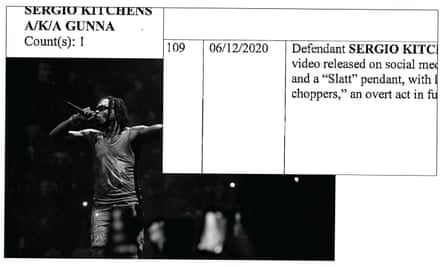



Erik Nielson and Andrea L. Dennis, legal experts and authors of the book Rap on Trial, agree. They have compiled a list of nearly 700 reported cases in which rap lyrics have been used by prosecutors in cases over the last three decades.
“In some cases the lyrics were presented as evidence at trial; in many others, the lyrics were used to justify charging a suspect, to secure an indictment, to compel a plea bargain, and/or to justify sentencing recommendations,” the Rap on Trial website states. As a result of this research, which has won the support of rappers such as Killer Mike, Jay-Z and Meek Mill, several legislators have started to take up the issue of whether rap lyrics should be used in court. Last year, Governor Gavin Newsom signed a bill in California that would restrict the use of rap lyrics in court and push judges to consider whether their use would introduce “racial bias into the proceedings”. Nielson is expected to be called during the YSL trial as a part of Williams’ defense.
But prosecutors say they’re not targeting Williams and his co-defendants because they’re rappers. Instead, they say the YSL case is a part of a larger crackdown on gang violence, to which they attributed 75-80% of crime in Atlanta in 2022.
And they say lyrics are not the main evidence they plan to introduce to a jury. Instead, the jury will seee text messages, jail phone calls, gang expert testimony and more. As of this week, the prosecution’s witness list includes about 400 people. While they estimate the trial will take six months, defense attorneys argue it will continue for most of next year.

